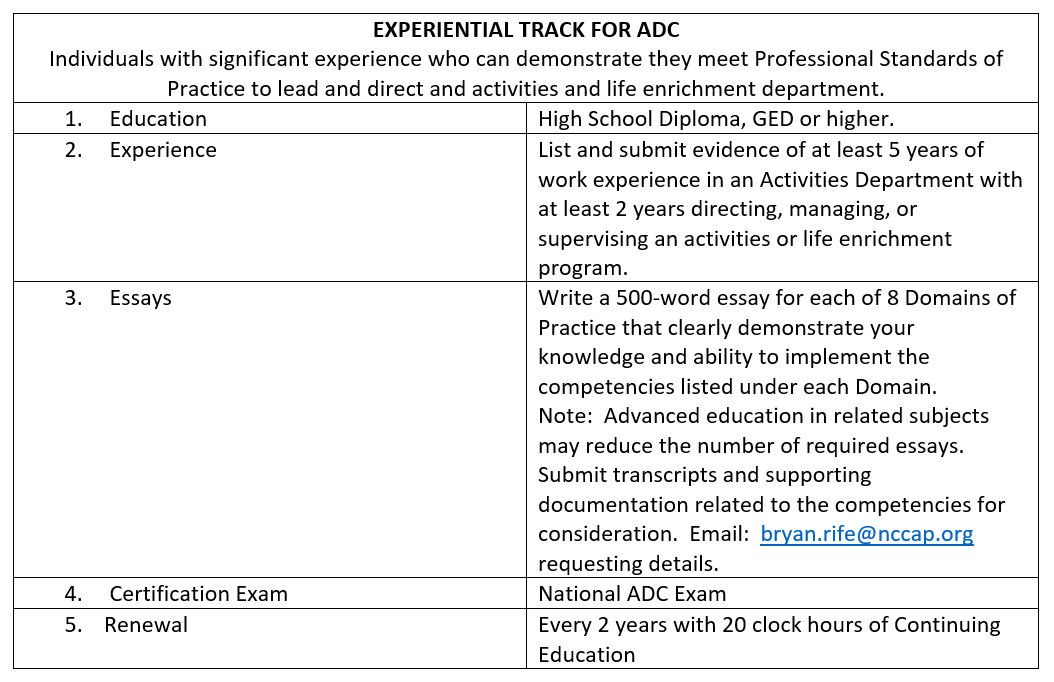|
EXPERIENTIAL TRACK FOR ACTIVITY DIRECTOR CERTIFICATION (ADC)
Individuals meeting the requirements of the Experiential Track can become Activity Director Certified (ADC).
The Experiential Track is designed for individuals who possess 5 or more years of experience in the field of Activities, including 2 years directing, managing, or supervising a program that delivers the Social Model of Care.
The required curriculum component for the Experiential Path is fulfilled by successfully completing a rigorous essay and practicum requirement, rather than by taking the MEPAP APC and MEPAP ADC.
The essays and practicum project are reviewed by NCCAP and you must pass the National Exam. (Do NOT proceed with writing essays until you have completed the survey below and received confirmation back from NCCAP to register and pay for this track)

The cost of this track is $400 and includes a Standardized Coursebook and National Exam fee
DOMAINS OF PRACTICE
1. Therapeutic Activity Concepts
A. Knowledge of the underlying concepts and framework of the activity profession within health
care organizations.
B. Possesses the skills to succeed within a health care community and successfully carry out
facility and departmental goals and objectives.
2. Standards, Regulations and Survey Process
A. Projects a professional image by demonstrating a positive attitude, takes pride in one’s work
and abides by the Standards and Scope of Practice of the activity profession.
B. Consistently broadens skills through continuing education, participates in professional groups,
complies with applicable regulations and ensures company policies and procedures are met.
3. Communication Strategies for the Activity Professional
A. Establishes interpersonal relationships and responds effectively as a Manager to feelings and
concerns communicated in various formats such as writing, speech, and nonverbal
communications.
B. Persuasively presents thoughts and ideas to gain commitment and to garner support,
possesses knowledge of workplace culture and has the ability to effectively function as a
Manager using written, verbal and non-verbal communication.
4. Aging Through the Life Span
A. Effectively utilizes theories of behavior, personality and psychosocial development including
specific knowledge of the quality of life needs of the older adult and can adapt approaches,
engagement and activities to ensure individual needs are met as age-related changes occur.
B. Implements individual and group approaches based on individual needs as it relates to the Six
Dimensions of Wellness established by the National Wellness Institute.
C. Upholds, honors and creates opportunities for spiritual, value and belief systems and can assist
in end of life transitions, Right to Die issues, bereavement, hospice and palliative care.
5. Cognitive and Behavioral Health
A. Possesses the ability to practice a holistic, person-centered approach to care and embrace a
positive approach to support persons living with dementia.
B. Effectively responds to family and community influences, behavioral risk factors, and sociocultural
patterns that influence the physical and mental health status of the individual receiving
care.
C. Advocates for non-pharmacological interventions when working with individuals who have
psychiatric and psychological disorders and implements non-pharmacological practices that are
person-centered, evidence-based, and feasible.
6. Documentation Responsibilities for the Activity Professional
A. Advances and maintains regulatory compliance of documentation and possess the skills to
translate this information into meaningful approaches, engagement and activities.
B. Uses assessment as an opportunity for information gathering, relationship-building, education,
and support including managing collaboration across the integrated care team.
C. Has the knowledge and skills to gather and document information related to policy development,
budgeting and quality assurance.
7. Person-Centered Engagement Programs
A. Creates person-centered group and individual programs with opportunities for growth,
socialization, comfort and overall quality of life.
B. Uses creativity and flexibility to meet the functional, cognitive and age-related variances of the
population being served to attain their highest physical and cognitive potential.
C. Creates opportunities for volunteer engagement within and outside the community.
8. Professional Growth and Management of Others
A. Possesses knowledge of self-care including the skills to identify triggers of stress and define
personal solutions within the care partner relationship.
B. Practices skills and techniques associated with departmental planning, personnel management
including staff selection, training, supervision and engagement, and the management function of
controlling quality assurance.
Take the Survey to confirm you meet the requirements of the Experiential Track. Please have your official letter that is on letterhead and signed by your supervisor that verifies you have the experience to upload in the survey: CLICK HERE.
Back to Activity Professionals Certification Page
|


